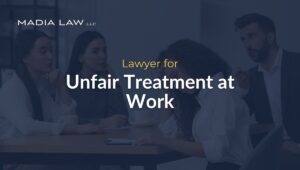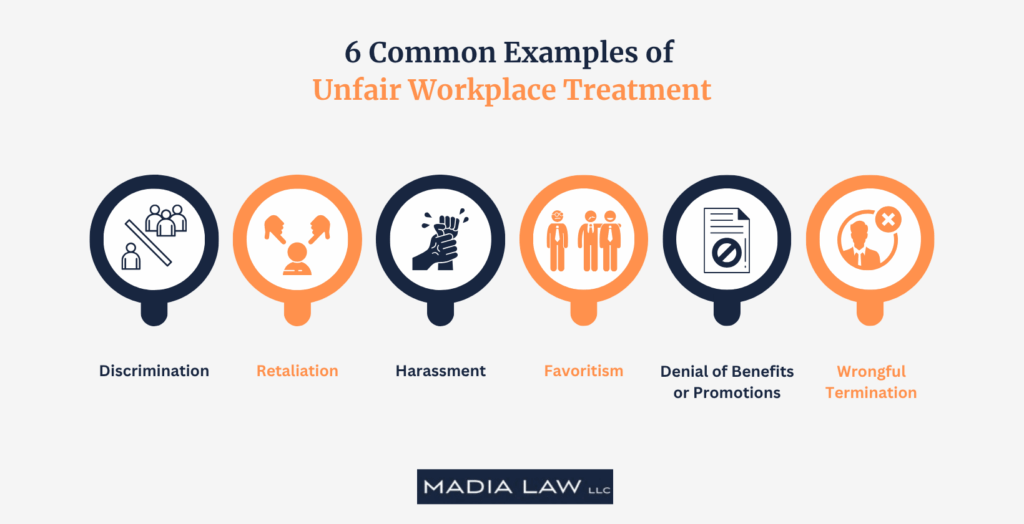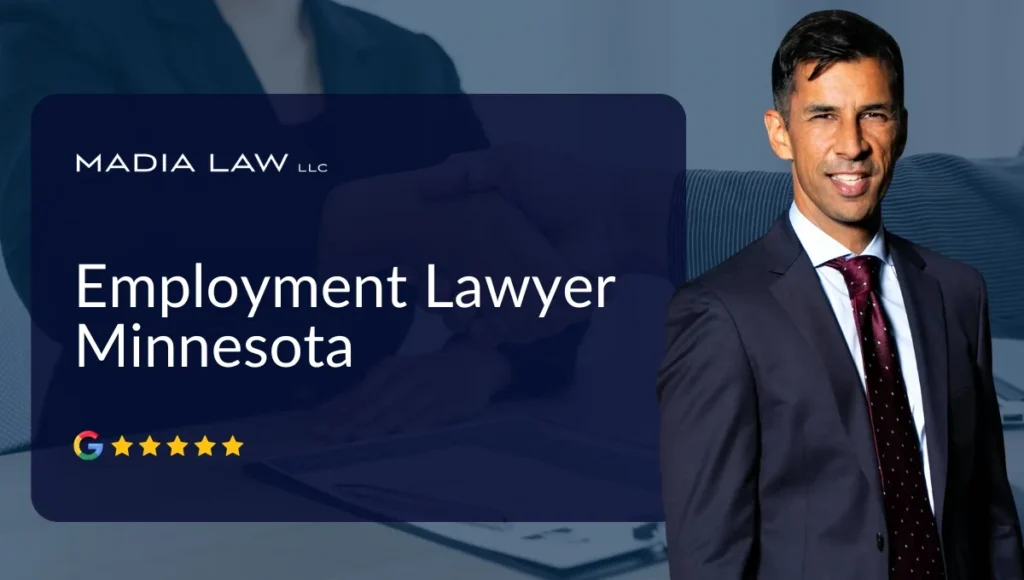
Unfair treatment at work can chip away at your confidence, mental well-being, and long-term career growth. Being overlooked for promotions, excluded from meetings, or disciplined after raising concerns is frustrating and can test your patience. It may also be a sign of something more serious, like retaliation, discrimination, or biased evaluations rooted in illegal behavior.
Unfair treatment can take many forms: harassment, favoritism, discrimination, or unequal access to promotions, pay, or benefits. These aren’t just signs of toxic management, they may violate federal or state employment laws designed to protect hardworking employees like you.
A knowledgeable Minnesota lawyer for unfair treatment at work can help you understand your rights, identify whether the conduct you’re facing is unlawful, and take action to hold your employer accountable. If you’ve been silenced, sidelined, demoted, or punished for speaking up, you don’t have to stand up and face what comes next on your own.
Headquartered in downtown Minneapolis, Madia Law LLC has stood with thousands of employees in the Land of 10,000 Lakes who have been mistreated for having the courage to do the right thing… and we will fight hard to make things right.
What Can a Workplace Lawyer Do for You?
A workplace lawyer does more than just file lawsuits; they become your advocate from the moment you realize something feels fishy.
They take the time to understand your situation, explain your rights clearly, and advise you on the best course of action. Whether you’re considering filing an internal complaint, negotiating a resolution, or preparing for legal action, a skilled attorney will guide you every step of the way.
Evaluating Your Case and Explaining Your Rights
The first step in addressing unfair treatment is understanding where you stand. A workplace lawyer will:
- Review your documents, emails, and records to uncover any potential legal violations.
- Clearly explain your rights under both federal and state employment laws, so you know exactly what protections apply to your situation.
- Assess the strength of your case and walk you through your legal options, whether that means internal resolution, filing a complaint, or pursuing legal action.
This initial evaluation empowers you with clarity, confidence, and an intelligent plan for what comes next.
Engaging with Employers on Your Behalf
When speaking up feels risky, a workplace lawyer steps in to be your voice and shield. They can:
- Communicate directly with your employer or HR to address unfair treatment while protecting you from retaliation or further harm.
- Negotiate severance packages, accommodations, or workplace resolutions that uphold your rights and prioritize your well-being.
- Having legal representation sends a clear message to the opposition: you know your rights, and more importantly you’re ready to act swiftly, smartly, and decisively to protect those rights.
Filing Complaints and Representing You In Court
When informal efforts don’t lead to the justice you desire, a workplace lawyer is prepared to take your case further. They will:
- File formal complaints with the EEOC or relevant state agencies to initiate an official investigation into your employer’s conduct.
- Represent you in all legal proceedings, including mediations, administrative hearings, and courtroom litigation if necessary.
- Stand by your side throughout the process, ensuring your rights are protected and that you’re shielded from retaliation.
For a legal consultation, call 612-349-2729
Can You Sue for Unfair Treatment at Work?
Yes, you can sue for unfair treatment at work when the conduct violates federal or state employment law.
Not every frustrating or biased decision qualifies, but if your legal rights are denied, you can take legal action to protect yourself and seek compensation.
When Do You Have a Legal Case
You have a legal case when unfair treatment involves discrimination, retaliation, or a violation of your employment contract.
Example: If you’re demoted after reporting sexual harassment or denied a raise because of your age, the employer is violating federal law.
To sue, the conduct must go beyond personal conflict and infringe on a legal right. A qualified Minneapolis-based employment lawyer can assess whether your situation meets the legal threshold.
What Makes a Strong Legal Case
A strong legal case in Minnesota courts for unfair treatment includes clear evidence, consistent documentation, and proof that your rights were violated under state or federal law.
Key elements include:
- Documented incidents: Emails, written warnings, performance reviews, or internal messages that show bias, retaliation, or unequal treatment.
- Witness support: Statements from coworkers who observed the unfair behavior or can confirm your claims.
- HR reports or complaints: Proof that you reported the issue internally before seeking legal help strengthens your position.
- Pattern of behavior: Repeated actions over time (not isolated events) often indicate unlawful treatment, especially when tied to a characteristic protected by the U.S. Constitution.
- Timeline consistency: Matching dates, logs, and evidence to show cause and effect strengthens your credibility.
A workplace lawyer can review these details and help you determine whether your case meets the legal standard for filing a claim.
Who Can You Sue (Company vs Individual)
When you’re mistreated at work, it’s important to understand who can be held legally accountable. In most cases, your lawsuit will be filed against your employer as a whole, i.e. the company or organization responsible for enforcing workplace policies and complying with employment laws.
However, there are situations where individual supervisors or managers can also be named in a claim, particularly if they personally engaged in unlawful behavior or if state law allows for individual liability (in Minnesota it does).
You may have the right to sue:
- Your employer for violating federal or state employment laws (such as discrimination, harassment, or retaliation).
- An individual supervisor or manager, if:
- They personally carried out the illegal conduct (e.g., harassment, threats, or retaliation).
- State law specifically allows individuals to be held responsible for certain actions.
Every case is different, and a qualified workplace attorney can help determine the best legal strategy whether that means holding the company accountable, pursuing action against an individual, or both.
When Should You Contact a Lawyer?
Workplace issues that appear minor can quickly escalate into bigger and more complex legal problems. Contact a lawyer early to protect your rights and build your case.
Early Warning Signs
Watch for early signs that your workplace issue may become a legal problem:
- Exclusion: You’re left out of meetings or key decisions without explanation.
- Unfair criticism: A manager begins targeting your work after you raise a concern.
- Isolation: Coworkers are told to avoid you or stop direct communication.
After HR Fails to Act
Contact a lawyer if HR ignores or mishandles your complaint:
- No follow-up: You filed a complaint, but HR hasn’t investigated or responded.
- Ongoing misconduct: The person you reported continues the same behavior without consequences.
- Dismissal without review: HR labels it a “personality conflict” without examining evidence.
In Cases of Retaliation or Threats
Legal help is critical when your employer retaliates after you assert your rights:
- Punishment after reporting: You’re demoted or lose hours after reporting harassment or discrimination.
- Verbal threats: A supervisor tells you not to “take things further” or threatens your job.
- Targeted reassignment: You’re moved to undesirable shifts or duties after filing a complaint.
What If You’re Still Employed and Experiencing Mistreatment?
Choosing to remain in a hostile or unfair work environment is difficult, but doing so does not mean you become powerless. A Minneapolis workplace hostile environment lawyer can help protect your rights while you’re still employed, guiding you on what to say, how to document issues, and how to avoid actions that could hurt your case. You don’t need to quit or even go on leave to seek legal help. In fact, taking action while still employed can strengthen your claim and preserve more of your legal options.
Click to contact our personal injury lawyers today
What is Considered Unfair Treatment at Work?
Not all unfair treatment is illegal, but some conditions are clear and absolute violations. The key difference lies in why the mistreatment is happening and whether it violates your well-defined legal rights.
Being micromanaged or excluded is not unlawful in and of itself. But if those actions are connected to your race, gender, disability or age, or to speaking up about witnessed misconduct, it could very well be grounds for legal action.
Look at patterns, motives, and legal protections to determine whether your employer crossed the legal line, and if so, what action you can take.
Legal vs Non-Legal Unfair Treatment
| Aspect | Legal Unfair Treatment | Non-Legal Unfair Treatment |
|---|---|---|
| Definition | Actions that violate federal or state employment laws. | Actions that are unfair or unethical, but not against the law. |
| Protected Basis Required? | Yes. Must involve protected traits (e.g., race, age, gender, religion, disability). | No. It can arise from favoritism, poor management, or personal bias. |
| Common Examples | Discrimination, retaliation, harassment, and wrongful termination. | Favoritism, micromanagement, exclusion, and rude behavior. |
| Employer Obligation to Correct | Yes. Employers must comply with the law and face consequences if they don’t. | No. Though it may breach internal policy, it’s not legally required. |
| Can You Sue | Yes. Legal action is possible if the conduct violates employment laws and is documented. | No. Unless the behaviour escalates into a legal violation, lawsuits aren’t possible. |
| EEOC Involvement | Yes. EEOC investigates violations involving protected categories or retaliation. | No. EEOC does not review cases that do not involve legal rights. |
| Impact on Employee Rights | Violations can result in compensation, reinstatement, or other legal remedies. | Limited. Typically handled internally through HR, if addressed at all. |
When Unfair Becomes Illegal
You may not know the exact moment your workplace crossed a legal line, but the signs are often there. Unfair treatment becomes illegal when it starts to show a pattern of targeting, exclusion, or punishment tied to a protected characteristic or protected action.
Ask yourself:
- Has the mistreatment continued after I raised a concern?
- Am I being singled out while others are treated differently for the same behavior, and can these instances be formally documented and/or recorded?
- Has my mental or physical health been affected by the behavior?
- Have I been punished after taking leave, reporting misconduct, or filing a complaint?
If the answer is yes to any of these, the unfairness may not just be wrong, it may be unlawful. That’s when it is probably time to speak with a workplace attorney who can help you take the next step.
Complete a Case Evaluation form now
How to Document Unfair Treatment: 5 Key Steps
When you’re experiencing unfair treatment at work, documentation is key. Accurate, detailed records can strengthen your case, whether you’re going to HR, a government agency, or a court.
These 5 steps will help you build a clear, credible record that protects your rights and supports your story.
Step 1: Record Incidents Immediately
Write down each incident as soon as it happens. Include dates, times, locations, specific actions or comments, and the names of anyone involved. The sooner you document it, the more accurate and credible it becomes.
Step 2: Collect Emails and Screenshots
Gather emails, chat logs, memos, or screenshots that show patterns of retaliation, exclusion, or bias. These digital records can serve as powerful evidence of how your employer’s treatment of you has evolved over time.
Step 3: Report to HR or Supervisor
File a formal, written complaint with HR or your supervisor. Be clear, factual, and professional in tone. Always keep a dated copy of what you submitted in case you need to show it later.
Step 4: File an EEOC or State Complaint
If the situation doesn’t improve or worsens, consider filing a complaint with the EEOC or your state’s labor agency. This creates an official legal record and may open the door to further protections.
Step 5: Consult an Employment Lawyer
Bring all of your documentation to a qualified employment attorney. They can evaluate your case, explain your rights, and guide you on whether to negotiate, escalate, or take legal action. You don’t have to tackle this challenging situation alone.
How to Choose the Right Employment Lawyer
When your job, livelihood, or reputation is on the line, choosing the right employment lawyer makes all the difference. You need someone who not only specializes in employment law in Minnesota but also understands the personal impact of what you’re going through.
Top 3 Qualifications to Look For
Not all attorneys are equipped to handle the complexities of workplace law. When choosing an employment lawyer, look for these essential qualifications:
- Focused expertise in employment law: Choose someone who concentrates on workplace rights, not a general practice attorney.
- A proven track record: Ask about past results, including verdicts, settlements, or resolved claims similar to yours.
- Proper licensing and credentials: Ensure they’re licensed to practice in Minnesota and in good standing with the Minnesota State Bar Association.
The right lawyer will have the credentials and the commitment to fight for your rights with skill and compassion.
5 Questions to Ask in a Consultation
A consultation is your opportunity to find out if an employment lawyer is the right fit, not just legally but personally. Ask these five questions to get the clarity and confidence you need before moving forward:
- Do you charge hourly, or do you work on a contingency basis?
- How many cases like mine have you successfully handled?
- What results have you achieved in similar situations?
- How available will you be if I have questions or need updates?
- If my case doesn’t succeed, will I still owe you anything?
The answers will help you understand their experience, their approach to communication, transparency, and your peace of mind throughout the process.
Experience in Discrimination & Retaliation Claims
Discrimination and retaliation cases are among the most complex in employment law. They require detailed evidence, knowledge of federal and state protections, and strict attention to legal timelines.
Choose a Minnesota employment lawyer with a proven record in these cases across various local counties (e.g., Hennepin County, Dakota County, Anoka County). Many general practitioners in the Midwest lack this specialized experience.
Laws That Protect You from Unfair Treatment
Several powerful state and federal laws protect employees from discrimination, harassment, and retaliation. These laws are the foundation of most workplace legal claims and give you the right to stand up for fair treatment.
- EEOC: The federal agency that enforces anti-discrimination laws. You often need to file a charge here before suing your employer.
- Title VII: Prohibits discrimination based on race, color, sex, religion, or national origin in hiring, pay, promotions, and more.
- ADA: Requires fair treatment and reasonable accommodations for employees with disabilities.
- ADEA: Protects workers aged 40+ from age-based discrimination in hiring, layoffs, and promotions.
- FMLA: Guarantees up to 12 weeks of unpaid, job-protected leave for medical or family reasons.
- MHRA (Minnesota): Offers broad protections, covering more categories and smaller employers than many federal laws.
Each of these laws offers unique protections, and understanding your rights starts with learning more about the specific Laws That Protect You from Unfair Treatment.
6 Common Examples of Unfair Workplace Treatment
Unfair treatment from your employer isn’t always obvious, and not all of it is illegal. But certain patterns, like discrimination, retaliation, harassment, favoritism, or denial of benefits, can cross the line into legal violations. Knowing the difference is key to protecting your rights.
- Discrimination: Unequal treatment based on race, gender, age, or other protected traits.
- Retaliation: Punishment for reporting wrongdoing or asserting your rights.
- Harassment: Repeated offensive behavior that creates a hostile work environment.
- Favoritism: Unfair preference that may disguise bias or discrimination.
- Denial of Benefits or Promotions: Being denied raises, leave, or accommodations without valid cause.
- Wrongful Termination: Being fired for illegal reasons, such as reporting harassment, taking protected leave, or refusing to break the law.
Each of these situations can look different in real life. To better understand your rights, take a closer look at the 6 Common Examples of Unfair Workplace Treatment and how they may apply to your case.
How Much Does a Workplace Lawyer Cost?
The cost of hiring a workplace lawyer depends on the fee structure and case complexity.
Hourly Rates vs Contingency Fees
Workplace lawyers typically use three common fee structures:
- Hourly rate: $330-$450 per hour, based on the lawyer’s experience and location.
- Contingency fee: You pay only if you win. The lawyer takes 20% of your settlement.
- Flat fee: A fixed price is charged for specific services like consultations, demand letters, or contract reviews.
Factors That Affect Cost
Several factors affect the cost of hiring a lawyer for unfair treatment at work:
- Case complexity: Multiple claims, witnesses, or legal issues increase cost.
- Evidence collected: Well-organized, detailed, and thorough pieces of proof reduce legal prep time and allows judges and juries to comprehend your arguments more easily.
- Location: Rates vary by city and region.
- Lawyer’s experience: Senior attorneys charge more.
Cases involving formal litigation or repeated filings typically cost more overall.
How Long Do You Have to File a Claim?
Timing matters in employment law, because filing deadlines, also called statutes of limitations, are strict and unforgiving. Missing a deadline could mean permanently losing your right to take legal action.
Federal Deadlines (EEOC)
The standard deadline to file with the EEOC is 180 days from the incident date.
This extends to 300 days in states that have their own anti-discrimination agency. These federal timelines apply to most workplace discrimination or retaliation claims.
State-Specific Limitations
Each state sets its own deadline for filing employment claims. Examples include:
- Minnesota: 1 year under the Human Rights Act
Always check your state’s deadline to preserve your right to file.
Exceptions and Extensions
In limited cases, exceptions can extend your filing deadline for unfair treatment claims. These include:
- Delayed discovery: You became aware of the unfair action later (discovery rule).
- Medical leave: You were unable to file during the deadline period.
- Fear of retaliation: You delayed filing due to threats or intimidation.
These exceptions are narrow. Legal deadlines still apply.
State vs. Federal Jurisdiction: Which Applies?
Jurisdiction depends on the type of violation and where it occurred.
Federal law applies to claims like discrimination under Title VII. State law often provides broader protections or longer deadlines. Where you file is determined by the violation, location, and available remedies.
FAQs Related to Unfair Treatment at Work
Can I sue my boss personally for unfair treatment at work?
Yes, you can sue your boss personally for unfair treatment at work, but only in specific cases under state law or if they directly violated your rights.
What if HR ignores my complaint about unfair treatment?
If HR ignores your complaint about unfair treatment at work, you can file with the EEOC or a state agency. Consult a lawyer to explore legal action.
Is unfair treatment the same as discrimination or harassment?
No, unfair treatment is not the same as discrimination or harassment, but it can include both when based on a protected characteristic under employment law.
Can I be fired for reporting unfair treatment?
No, you cannot be legally fired for reporting unfair treatment at work; doing so may qualify as unlawful retaliation under federal or state laws.
Do I need evidence to prove unfair treatment at work?
Yes, you need evidence to prove unfair treatment at work, such as emails, witness statements, or written records, to support your legal claim.
Can I get compensation for unfair treatment at work?
Yes, you can get compensation for unfair treatment at work if your rights were violated under employment law and you win or settle your case.
How long does it take to resolve an unfair treatment case?
An unfair treatment at work case can take a few months to over a year, depending on the complexity, evidence, and whether it reaches settlement early on or winds up going to court.
Can I remain anonymous when reporting unfair treatment?
No, not fully. Your name will likely be disclosed during the investigation, but laws may protect your identity from public exposure.
Take the First Step Toward Justice
Unfair treatment at work violates your rights, and legal deadlines move fast. You have the right to act, protect your job, and assert your workplace rights.
At Madia Law LLC, our Minneapolis-based attorneys have recovered millions for Minnesota employees facing illegal treatment at work. We are known for winning discrimination, retaliation, wrongful termination, and other employment-related cases in multiple counties across the Gopher State.
Don’t wait. Contact Madia Law LLC to consult with an experienced Minnesota employment lawyer and protect your right to take action.
Call 612-349-2729 or complete a Case Evaluation form



